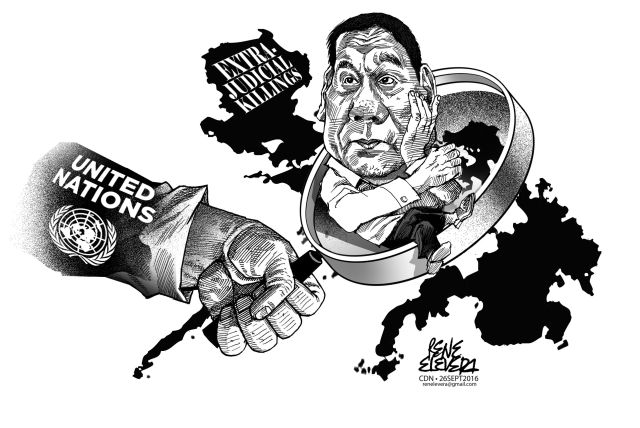
When President Rodrigo Duterte invited officials from the United Nations, the United States and the European Union to investigate reports of extrajudicial killings, he probably had no idea that they would take his invitation seriously.
When the UN confirmed that it will send a team to investigate these killings, which usually involve suspected drug users, drug dealers and drug lords, the government’s Department of Foreign Affairs (DFA) wasted no time scrambling for conditions or parameters that they would set for the team in their investigation.
That one of their parameters or conditions involved prohibiting any visits to slum areas where a lot of the drive-by shootings and summary executions occurred had drawn suspicions from the Duterte administration’s top critic, Sen. Leila de Lima, who objected as to why that condition had to be imposed.
And there’s little arguing as to why her argument is justified considering that the Duterte administration’s reputation is on the line here. That the President himself attracted global attention for his outburst against US President Barack Obama meant that he was responsible for spurring other governments into taking a long, hard look on what he is doing in his war against illegal drugs.
In fairness, President Duterte’s invitation, even if previously predicated on the condition that he will also question those visiting teams about how they are dealing with other countries that committed similar, even worse, rights violations, is a step towards transparency and accessibility not only to foreigners but also to Filipinos who have doubts about how the government is cracking down on crime.
And it is established protocol among countries around the world to set up parameters during investigations by UN teams who are in some part dependent on the host country’s protection in conducting their inquiry.
There may be a need to set up parameters for the UN team investigating the extrajudicial killings, but we hope that these won’t compromise as well as impose restrictions on how they conduct their investigation.
While this may be getting ahead of ourselves, a bigger concern not only for the Duterte administration but to Filipinos as well is how the outcome
will impact on the relations between the Philippines and the global community of which it is a part of ever since the UN was founded.
Still, the UN inquiry may either mean a halt on those summary executions committed by faceless assassins or an opening for drug syndicates to further demolish the Duterte administration’s already controversial reputation before the world by committing executions of rivals and making it look like the work of “death squads.”
Filipinos should monitor this development, which may cover parts of Cebu and Bohol where police operations against major drug dealers have ended on a bloody note.